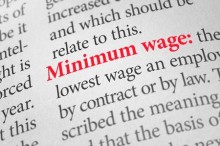Employment Law: National Minimum Wage
 The National Minimum Wage is the minimum pay per hour almost all workers in the UK are entitled to.
The National Minimum Wage is the minimum pay per hour almost all workers in the UK are entitled to.
Employers must pay the national minimum wage by law. It doesn’t matter how small an employer is, they still have to pay the minimum wage. This includes part-time workers, casual labourers, agency workers, home workers, workers on short-term contracts and workers employed by subcontractors.
Workers do not require a contract in order to be eligible for the minimum wage – and contracts to pay less than the minimum wage, even if the employee has agreed, are not legally binding.
The minimum wage rate depends on a worker’s age and if they’re an apprentice. This table shows the National Minimum Wage rates – these rates are usually updated every October, and the current rates apply from October 2015.
| YEAR | 21 and over | 18 to 20 | Under 18 | Apprentice* |
|---|---|---|---|---|
| 2015 (current rate) | £6.70 | £5.30 | £3.87 | £3.30 |
| 2014 | £6.50 | £5.13 | £3.79 | £2.73 |
| 2013 | £6.31 | £5.03 | £3.72 | £2.68 |
| 2012 | £6.19 | £4.98 | £3.68 | £2.65 |
| 2011 | £6.08 | £4.98 | £3.68 | £2.60 |
| 2010 | £5.93 | £4.92 | £3.64 | £2.50 |
*This rate is for apprentices aged 16 to 18 and those aged 19 or over who are in their first year. All other apprentices are entitled to the National Minimum Wage for their age.
A compulsory National Living Wage is due to be introduced in April 2016 for all working people aged 25 and over, and will be set at £7.20 per hour. The current National Minimum Wage for those under the age of 25 will continue to apply.
 The average pay for each hour of work completed by eligible workers during any pay reference period must not fall below the minimum wage. Pay reference periods are usually set by how often someone is paid e.g. weekly, fortnightly, or monthly. A pay reference period cannot be longer than 31 days. All employees are entitled to an individual written payslip, at or before the time they are paid (a written payslip could also be a payslip sent by email).
The average pay for each hour of work completed by eligible workers during any pay reference period must not fall below the minimum wage. Pay reference periods are usually set by how often someone is paid e.g. weekly, fortnightly, or monthly. A pay reference period cannot be longer than 31 days. All employees are entitled to an individual written payslip, at or before the time they are paid (a written payslip could also be a payslip sent by email).
Some workers are not entitled to the minimum wage. These include:
• the genuinely self-employed (not sure if you are employed or self-employed? More information on the Citizen’s Advice website here)
• company directors
• office holders
• workers younger than school leaving age (usually 16)
• students on a work placement of less than one year which forms part of UK higher or further education courses
• voluntary workers
• those participating in European Union programmes: Leonardo da Vinci, Youth in Action, Erasmus, Comenius
• residential members of charitable (e.g. religious) communities
• workers employed in a Jobcentre Plus work trial (only for the first six weeks)
• members of the armed forces
• share fishermen
• prisoners
• family members working for a family business who live in the family home
• non-family members (such as au pairs and nannies) living in a family home where they work and do not have to pay towards their accommodation costs or meals
• some trainees on government schemes
• workers who are homeless or living in a hostel, who are entitled to Income Support, income-related Employment and Support Allowance or income-based Jobseeker’s Allowance and who are taking part in a scheme run by a charity which provides them with work
With the exception of those included in the above list, it is against the law for employers to pay workers less than the National Minimum Wage or to falsify payment records. If an employer doesn’t pay the correct rate, a worker should first talk to their employer and try to resolve the issue informally. If this doesn’t work a worker may make a formal grievance to their employer. A worker can also make a complaint to HMRC who will investigate.
If an employer is found to have not paid the minimum wage, arrears must be paid immediately and the employer may also face a penalty.
Employers must also not discriminate in the amount that they pay their workers, e.g. because of their race or gender, when they are doing work of equal value. This is known as equal pay.
At Gordon Dean Solicitors we specialise in Employment Law and can help and advise you on any of the issues raised here. For a free initial consultation, contact us today on 01603 767671 or fill in our contact form.
National Minimum Wage – Useful links
Citizen’s Advice: https://www.citizensadvice.org.uk/work/rights-at-work/rights-to-pay/
UK Government website (including National Minimum Wage calculator): https://www.gov.uk/national-minimum-wage/what-is-the-minimum-wage
Law Donut, advice for employers: http://www.lawdonut.co.uk/law/employment-law/pay-and-pensions/the-minimum-wage-faqs
Acas: http://www.acas.org.uk/nmw